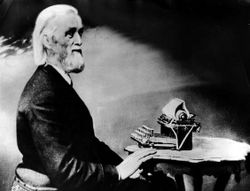One of the greatest technological breakthroughs in the history of communications would have to be the typewriter. Being developed all throughout the 19th century, the first practical typewriter was not invented until 1867 by an American inventor named Christopher Lantham Sholes.
Sholes gained inspiration for his model from an article he read in the Scientific American about a British inventor who was working on a similar type of machine. During the next few years Sholes continued to develop and fine-tune his typewriter, such as making it faster and more efficient. It wouldn't be until 1873 that the machine would come to reality, when Sholes signed a contract with E. Remington and Sons in Ilion, NY to being the manufacturing of his typewriter. The first model was put out the following year and was branded as the "Remington". Even then, the initial model still had some kinks to straighten out. For example, the original model did not have a shift key meaning that it could only type capital letters. However, this was remedied in 1878 with the Remington Model 2.
Remington Model 2 Typewriter
Once the Remington was first introduced, many companies wanted to begin the manufacturing of their own models of typewriters and the industry began to take off. Versions of electric typewriters were experimented with in the 1870s, with Thomas Edison inventing the first one in 1872. Later on in 1920, James Smathers introduced a more practical, office-use electric typewriter. Another advancement for typewriters was making them portable, with the first one being introduced to the market in 1909. Some features that were worked on ended up not being successful, however, such as noiseless models because it was unable to print letters dark enough.
The typewriter had immediate positive impacts on the working world once it was manufactured for the public. First off, it drastically increased both the speed and efficiency of office work for businesses and government and allowed for information to be communicated much faster. Typewriters also greatly helped people with disabilities such as blindness to be able to communicate through writing. However, the most significant effect typewriters had was on women in the workplace. Specifically, between the 1950's and 70's there was a massive increase in the amount of female stenographers and typists with around 64% of the field being comprised of women.




